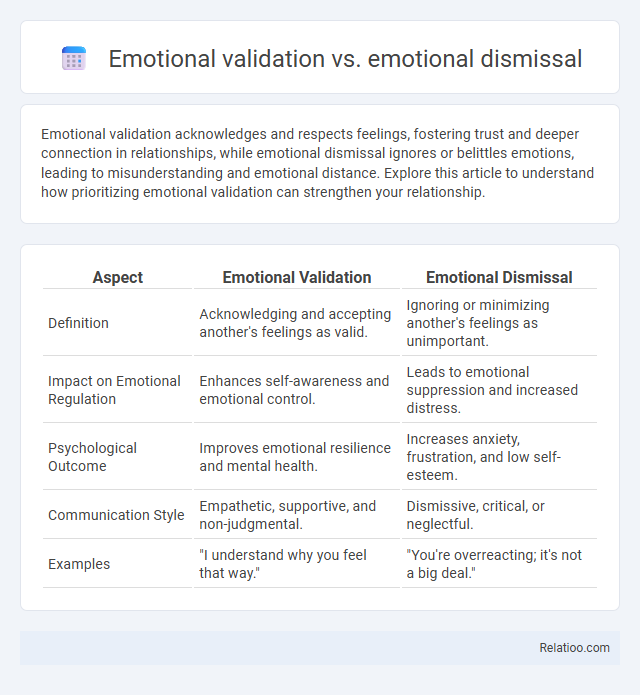Emotional validation acknowledges and respects feelings, fostering trust and deeper connection in relationships, while emotional dismissal ignores or belittles emotions, leading to misunderstanding and emotional distance. Explore this article to understand how prioritizing emotional validation can strengthen your relationship.
Table of Comparison
| Aspect | Emotional Validation | Emotional Dismissal |
|---|---|---|
| Definition | Acknowledging and accepting another's feelings as valid. | Ignoring or minimizing another's feelings as unimportant. |
| Impact on Emotional Regulation | Enhances self-awareness and emotional control. | Leads to emotional suppression and increased distress. |
| Psychological Outcome | Improves emotional resilience and mental health. | Increases anxiety, frustration, and low self-esteem. |
| Communication Style | Empathetic, supportive, and non-judgmental. | Dismissive, critical, or neglectful. |
| Examples | "I understand why you feel that way." | "You're overreacting; it's not a big deal." |
Understanding Emotional Validation
Emotional validation involves recognizing and affirming another person's feelings as genuine and important, fostering trust and empathy within relationships. Emotional dismissal, by contrast, negates or minimizes these feelings, often leading to misunderstanding and emotional distance. Effective relational repair hinges on emotional validation, as acknowledging emotions paves the way for reconciliation and strengthens interpersonal bonds.
Defining Emotional Dismissal
Emotional dismissal occurs when your feelings are ignored, minimized, or invalidated, often leading to emotional disconnect and increased relational tension. Unlike emotional validation, which acknowledges and accepts your emotions, dismissal can cause harm by signaling that your experiences are not important or legitimate. Understanding emotional dismissal is crucial for facilitating effective relational repair and fostering healthier communication.
The Psychology Behind Emotional Responses
Emotional validation involves recognizing and affirming your feelings, which fosters trust and psychological safety within relationships, whereas emotional dismissal negates or minimizes your emotions, often leading to increased stress and relational strain. Relational repair focuses on strategies like active listening, empathy, and apology to rebuild connection after emotional harm, highlighting the importance of addressing emotional responses for healthy interpersonal dynamics. Understanding these psychological processes can improve your emotional intelligence and promote resilience in social interactions.
Signs of Emotional Validation
Signs of emotional validation include active listening, acknowledging feelings without judgment, and expressing empathy toward your emotions. When someone practices emotional validation, they reflect back your feelings accurately and create a safe space for open communication. This approach contrasts with emotional dismissal, which ignores or minimizes feelings, and is crucial for fostering relational repair by rebuilding trust and understanding.
Signs of Emotional Dismissal
Signs of emotional dismissal include ignoring or minimizing another person's feelings, interrupting their expressions of emotion, and offering unsolicited advice instead of empathy. This behavior often leads to feelings of invalidation, increased emotional distance, and impaired communication within relationships. Recognizing these signs is essential for fostering emotional validation and facilitating effective relational repair.
Impact on Mental Health and Relationships
Emotional validation strengthens your mental health by fostering trust and empathy, reducing stress, and promoting emotional resilience in relationships. Emotional dismissal, on the other hand, harms mental well-being by increasing feelings of isolation, anxiety, and depression, which can erode relational trust and intimacy. Relational repair techniques, such as active listening and sincere apology, help restore connection and improve emotional safety, leading to healthier interactions and enhanced psychological stability.
Benefits of Practicing Emotional Validation
Practicing emotional validation enhances your relationships by fostering trust and deeper understanding between individuals, reducing conflicts and emotional distress. Unlike emotional dismissal, which can damage self-esteem and create communication barriers, validation acknowledges feelings and promotes emotional safety. Relational repair becomes more effective when both parties feel heard and respected, allowing for reconciliation and stronger emotional bonds.
Consequences of Emotional Dismissal
Emotional dismissal often leads to increased feelings of loneliness, mistrust, and emotional distress, harming your mental health and weakening interpersonal connections. When your emotions are invalidated, it can cause long-term damage to relationships by fostering resentment and communication breakdowns. Relational repair requires acknowledging and validating emotions to rebuild trust and foster emotional safety.
Strategies to Foster Emotional Validation
To foster emotional validation effectively, prioritize active listening by acknowledging and reflecting Your partner's feelings without judgment, which helps build trust and understanding. Use empathetic communication techniques, such as expressing genuine concern and paraphrasing emotions, to demonstrate that emotional experiences are recognized and valued. Encourage open dialogue and maintain an environment where emotions can be shared safely, reducing the risk of emotional dismissal and promoting relational repair.
Transforming Dismissal into Validation
Transforming emotional dismissal into validation involves recognizing and affirming another person's feelings to foster trust and connection, critical for effective relational repair. Emotional validation acknowledges the authenticity of emotions, reducing defensive reactions and opening pathways for constructive communication. By replacing dismissal with empathy and understanding, relationships heal more deeply, promoting resilience and mutual respect.

Infographic: Emotional validation vs Emotional dismissal
 relatioo.com
relatioo.com